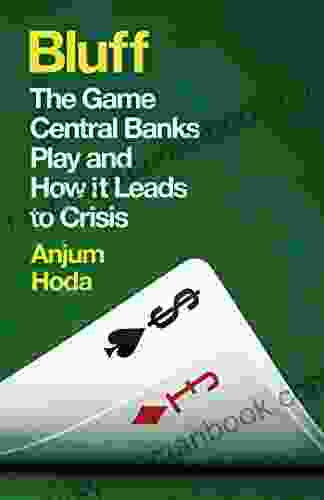The Game Central Banks Play: A Recipe for Crisis

4.5 out of 5
| Language | : | English |
| File size | : | 1479 KB |
| Text-to-Speech | : | Enabled |
| Enhanced typesetting | : | Enabled |
| Word Wise | : | Enabled |
| Print length | : | 234 pages |
| Screen Reader | : | Supported |
Central banks are the gatekeepers of the global financial system. They control the supply of money and credit, and they set interest rates. Their decisions have a profound impact on the economy, and they can either promote financial stability or sow the seeds of crisis.
In recent years, central banks have played an increasingly interventionist role in the economy. They have slashed interest rates to record lows and they have engaged in massive bond-buying programs (also known as quantitative easing). These policies have helped to boost economic growth and prevent a financial meltdown.
However, these policies have also come with a cost. Low interest rates have encouraged excessive risk-taking and they have inflated asset prices. Quantitative easing has increased the risk of inflation and it has made central banks more vulnerable to financial shocks.
The Dangers of Low Interest Rates
Low interest rates can have a number of negative consequences for the economy. They can:
- Encourage excessive risk-taking: When interest rates are low, investors are more likely to take on riskier investments in search of yield. This can lead to asset bubbles and financial instability.
- Inflate asset prices: Low interest rates make it cheaper to borrow money, which can lead to inflation in asset prices. This can make it difficult for people to afford homes and other assets.
- Reduce the effectiveness of monetary policy: When interest rates are already low, central banks have less room to cut rates in response to economic shocks. This can make it difficult to prevent recessions and financial crises.
The Risks of Quantitative Easing
Quantitative easing (QE) is another tool that central banks can use to boost the economy. QE involves buying large quantities of bonds from the private sector. This increases the money supply and it lowers interest rates.
QE can be an effective way to stimulate economic growth. However, it can also come with a number of risks, including:
- Increased inflation: QE can lead to inflation if the economy does not grow fast enough to absorb the additional money supply.
- Financial instability: QE can encourage excessive risk-taking and it can make the financial system more vulnerable to shocks.
- Increased dependency on central banks: QE can make central banks more vulnerable to financial shocks and it can increase the risk of moral hazard (where market participants believe that central banks will always bail them out).
The Need for a Balanced Approach
Central banks play a vital role in the global economy. However, their actions can also lead to financial crises. It is important for central banks to adopt a balanced approach that promotes financial stability without sacrificing economic growth.
Central banks should use interest rates and QE judiciously. They should not hesitate to raise interest rates if there are signs of excessive risk-taking or inflation. They should also be prepared to unwind QE when the economy is strong enough to stand on its own.
By taking a balanced approach, central banks can help to prevent financial crises and promote sustainable economic growth.
4.5 out of 5
| Language | : | English |
| File size | : | 1479 KB |
| Text-to-Speech | : | Enabled |
| Enhanced typesetting | : | Enabled |
| Word Wise | : | Enabled |
| Print length | : | 234 pages |
| Screen Reader | : | Supported |
Do you want to contribute by writing guest posts on this blog?
Please contact us and send us a resume of previous articles that you have written.
 Top Book
Top Book Novel
Novel Fiction
Fiction Nonfiction
Nonfiction Literature
Literature Paperback
Paperback Hardcover
Hardcover E-book
E-book Audiobook
Audiobook Bestseller
Bestseller Classic
Classic Mystery
Mystery Thriller
Thriller Romance
Romance Fantasy
Fantasy Science Fiction
Science Fiction Biography
Biography Memoir
Memoir Autobiography
Autobiography Poetry
Poetry Drama
Drama Historical Fiction
Historical Fiction Self-help
Self-help Young Adult
Young Adult Childrens Books
Childrens Books Graphic Novel
Graphic Novel Anthology
Anthology Series
Series Encyclopedia
Encyclopedia Reference
Reference Guidebook
Guidebook Textbook
Textbook Workbook
Workbook Journal
Journal Diary
Diary Manuscript
Manuscript Folio
Folio Pulp Fiction
Pulp Fiction Short Stories
Short Stories Fairy Tales
Fairy Tales Fables
Fables Mythology
Mythology Philosophy
Philosophy Religion
Religion Spirituality
Spirituality Essays
Essays Critique
Critique Commentary
Commentary Glossary
Glossary Bibliography
Bibliography Index
Index Table of Contents
Table of Contents Preface
Preface Introduction
Introduction Foreword
Foreword Afterword
Afterword Appendices
Appendices Annotations
Annotations Footnotes
Footnotes Epilogue
Epilogue Prologue
Prologue William H Davidow
William H Davidow Sajid Rahman
Sajid Rahman Harry Stillwell Edwards
Harry Stillwell Edwards Bhagat Singh
Bhagat Singh Bella Andre
Bella Andre Valerie Nifora
Valerie Nifora Leona Deakin
Leona Deakin Hazlo Emma
Hazlo Emma Jeffrey Robb
Jeffrey Robb Jeff Hilderman
Jeff Hilderman Stacey Abrams
Stacey Abrams Mark Moore
Mark Moore William Langland
William Langland J R Rogue
J R Rogue Kalervo N Gulson
Kalervo N Gulson Evandro Silva Cruz
Evandro Silva Cruz Ann Omasta
Ann Omasta Mark Condon
Mark Condon Jeff E Brooks Harris
Jeff E Brooks Harris Nikki Rose
Nikki Rose
Light bulbAdvertise smarter! Our strategic ad space ensures maximum exposure. Reserve your spot today!

 Douglas FosterBrother Joe Novel Trinity Tarrow: A Journey of Self-Discovery, Redemption,...
Douglas FosterBrother Joe Novel Trinity Tarrow: A Journey of Self-Discovery, Redemption,...
 Darren NelsonUnveiling See Pattern Here: A Comprehensive Guide to Revolutionizing Image...
Darren NelsonUnveiling See Pattern Here: A Comprehensive Guide to Revolutionizing Image... Alexandre DumasFollow ·14k
Alexandre DumasFollow ·14k Stephen FosterFollow ·19.6k
Stephen FosterFollow ·19.6k Will WardFollow ·11.8k
Will WardFollow ·11.8k Jay SimmonsFollow ·8k
Jay SimmonsFollow ·8k Hank MitchellFollow ·16.1k
Hank MitchellFollow ·16.1k Eric NelsonFollow ·5.2k
Eric NelsonFollow ·5.2k Diego BlairFollow ·11.9k
Diego BlairFollow ·11.9k William WordsworthFollow ·2.6k
William WordsworthFollow ·2.6k

 Roland Hayes
Roland HayesFive Unique Eating Plans to Shatter Your Weight Loss...
Weight loss journeys can be a rollercoaster...

 Gustavo Cox
Gustavo CoxThe Small Habits Revolution: How Tiny Changes Can...
Are you ready to...

 Herman Mitchell
Herman MitchellVisit Alook Cool Place In Outer Space Let Explore The...
Welcome to the World Series...

 Hassan Cox
Hassan CoxGaunt's Ghosts Omnibus: A Comprehensive Guide to the Epic...
Prepare to embark on an...
4.5 out of 5
| Language | : | English |
| File size | : | 1479 KB |
| Text-to-Speech | : | Enabled |
| Enhanced typesetting | : | Enabled |
| Word Wise | : | Enabled |
| Print length | : | 234 pages |
| Screen Reader | : | Supported |












